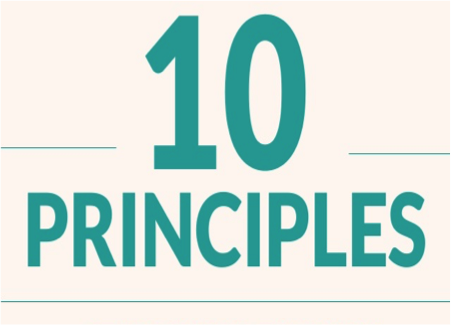10 Principles of a Good Listener
When you are listening effectively, you are concentrating and using other senses apart from your hearing. . Earlier, we said that hearing is not the same as listening. A good listener will listen not only to what is being said but also to what is left unsaid or only partially said. Effective listening involves observing body language and noticing inconsistencies between verbal and nonverbal messages.
When you have set a goal to become more adept as a listener, you can learn to follow these principles:
1: Prepare Yourself to Listen
- Focus on the speaker.
- The human mind is easily distracted by other thoughts – “What’s for lunch? “What time do I need to leave to get home?” “Is it going to rain?” Try not to get derailed by these distracting thoughts.
- If you have something on your mind that you are having trouble putting aside, make a note for yourself. Group facilitators refer to this as a parking lot.
2: Stop Talking
- Don’t talk, listen.
- Don’t interrupt, talk over them or finish their sentences for them.
3: Put the Speaker at Ease
- Help the speaker feel free to speak.
- Remember their needs and concerns.
- Nod or use other gestures or words to encourage them to continue.
- Maintain eye contact but don’t stare – show you are listening and understanding what is being said. A little trick here is to go back and forth between looking at the speaker’s left & right eyes. This helps prevent feeling like you’re in a staredown.
4: Limit Distractions
- Don’t doodle, shuffle papers, look out the window, look at your phone when that text comes in, flick your pen, or pick your fingernails.
- Avoid unnecessary interruptions.
5: Empathize
- Try to understand the other person’s point of view.
- Let go of preconceived ideas.
- By having an open mind, you can more fully empathize with the speaker.
- If the speaker says something that you disagree with – wait till they’ve finished to construct and convey your different perception or opinion.
6: Be Patient
- A pause, even a long pause, does not necessarily mean that the speaker has finished. If you’re not sure, it’s okay to ask.
- Be patient and let the speaker continue in their own time. Sometimes it takes time to formulate what to say and how to say it.
- Never interrupt or finish a sentence for someone.
7: Be Aware of Personal Prejudice
- Try to be impartial.
- Sometimes a speaker’s habits or mannerisms can irritate us. Don’t let that distract you from what they are really saying.
- Everyone has a different way of speaking
- Some people are more nervous or shy than others.
- Some have regional accents or gesticulate excessively.
- Some people like to pace while talking.
- Focus on what is being said and try to ignore the style of delivery.
8: Listen to the Tone
- Both volume and tone adds to what someone is saying.
- An effective speaker will use both to their advantage to keep an audience attentive.
- Everyone will use pitch, tone and volume of voice in certain situations.
- Let these help you to understand the emphasis of what is being said.
9: Listen for Ideas – Not Just Words
- You need to get the whole picture, not just isolated bits and pieces.
- Maybe one of the most difficult aspects of listening is the ability to link together pieces of information to reveal the ideas of others.
- Listening for ideas becomes easier with proper concentration, letting go of distractions and focus
10: Wait and Watch for Nonverbal Communication
- Gestures, facial expressions, and eye-movements can all be important.
- We don’t just listen with our ears but also with our eyes.
- Watch and pick up the additional information being transmitted via non-verbal communication.
Check out this video from Everybody Loves Raymond to see some of these principles in action (3 minutes) |


